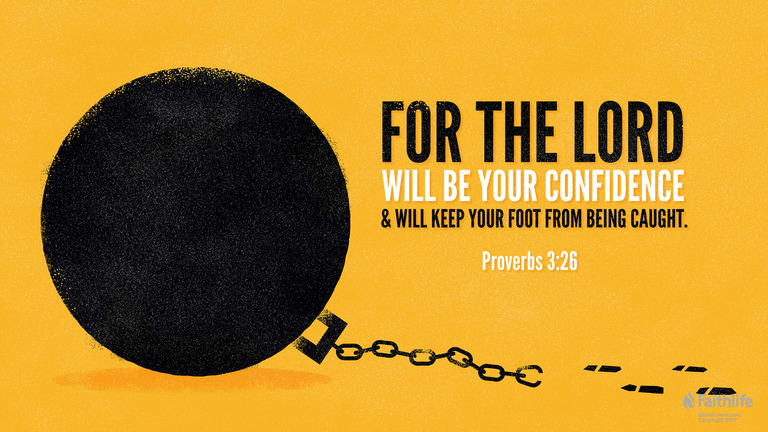Daily Verse Proverbs 3:26 | Daily verse by Faithlife
- Thread starter SC Facilitator
- Start date
You are using an out of date browser. It may not display this or other websites correctly.
You should upgrade or use an alternative browser.
You should upgrade or use an alternative browser.
Cross References:
1 Sa 2:9 | He will guard the feet of his faithful ones, but the wicked will be destroyed in the darkness, because a man will not prevail by his might.
2 Ki 18:5 | He trusted in Yahweh the God of Israel; there was no one like him, before or after, among all the kings of Judah.
Job 4:6 | Is not your fear in God your confidence? Is not your hope even the integrity of your ways?
Job 5:19 | From six troubles he will deliver you, and in seven evil shall not touch you.
Commentaries:
3:21–35 In this section, the father encourages his son to keep wisdom close. He describes the safety and security that comes from a life lived in wisdom (Prov 3:23–26). He then gives a series of commands pertaining to the treatment of others (vv. 27–31). Finally, he describes Yahweh’s attitude toward the wicked and the righteous (vv. 32–35).
John D. Barry et al., Faithlife Study Bible (Bellingham, WA: Lexham Press, 2012, 2016), Pr 3:21–35.
Notes for 3:26
78 tn Or “the LORD will be at your side.” Assuming that the noun כֶּסֶל (kesel) is related to the root II כָסַל (“confidence”; BDB 492 s.v. כֶּסֶל 3), the preposition ב (bet) introduces the predicate noun כִּסְלֶךָ (kislekha, “your confidence”) and functions as a beth essentiae (GKC 379 §119.i) which emphasizes the quality or nature of the noun (BDB 88 s.v. בְּ 7; HALOT 104 s.v. בְּ 3): “the LORD will be your confidence.” However, if the noun is related to I כסל (“loins; side”; HALOT 489 s.v. I כֶּסֶל 2), the preposition ב (bet) would function in a locative sense: “the LORD will be at your side.” See tn on the following phrase “source of your confidence.”
79 tn Heb “your confidence” (so NAB, NIV, NRSV) or “at your side.” There is debate whether the term כֶּסֶל (kesel) is related to the root I כָסַל “loins; side” (so HALOT 489 s.v. I כֶּסֶל 2) or II כָסַל “confidence” (so BDB 492 s.v. כֶּסֶל 3). The Vulgate relates it to I כָסַל and offers “the LORD will be at your side (latus).” Others relate it to II כָסַל “confidence” (e.g., Job 8:14; 31:24; Ps 78:7) and take it as a metonymy (= confidence) of adjunct (= object of confidence): “the LORD will be the source [or, object] of your confidence.”
80 sn The term רַגְלְךָ (raglekha, “your foot”) functions as a synecdoche of part (= your foot) for the whole person (= you). This synecdoche develops the extended comparison between the hunter’s snare and calamity that afflicts the wicked.
81 tn Heb “from capture.” The noun לָכֶד (lakhed, “capture; snare”) occurs only here in OT (BDB 540 s.v.; HALOT 530 s.v. לֶכֶד). It is figurative for the calamity of v. 25. God will protect the wise (or, righteous) from the consequences of sin (snares) that afflict the wicked.
Biblical Studies Press, The NET Bible First Edition Notes (Biblical Studies Press, 2006), Pr 3:26.
3:23–26 On safely, see “securely” in note at 1:33. Though the wicked will suddenly come to ruin at their ending (Ps 35:8; Is 10:3; 47:11; 1Th 5:3), those who maintain wisdom (Pr 3:21) will never be in such danger—whether awake or asleep—because the LORD will protect them.
David K. Stabnow, “Proverbs,” in CSB Study Bible: Notes, ed. Edwin A. Blum and Trevin Wax (Nashville, TN: Holman Bible Publishers, 2017), 958.
3:22–26. These verses mention a number of benefits that come to those who heed the exhortation in verse 21. These benefits include life (v. 22; cf. comments on v. 18), safety (v. 23; cf. 1:33; 2:7–8), avoidance of troubles (cf. 3:6), peaceful sleep (v. 24), confidence in the future (vv. 25–26a), and avoidance of traps set by the wicked (cf. 1:15–18). The long life referred to in 3:22 may be partially attributed to the peace of mind so graphically pictured in verses 23–26.
Sid S. Buzzell, “Proverbs,” in The Bible Knowledge Commentary: An Exposition of the Scriptures, ed. J. F. Walvoord and R. B. Zuck, vol. 1 (Wheaton, IL: Victor Books, 1985), 912–913.
3:26
For the Lord will be your confidence: For introduces this verse as the reason for the encouragement given in verse 25. Confidence refers to trust, faith, reliability. In the context of verses 24–25, confidence has the sense of courage, hope, security in the presence of threatening conditions. We may translate, for example, “The Lord will give you courage,” “The Lord will keep you safe,” or in some languages idiomatically “The Lord will make your liver quiet.”
Will keep your foot from being caught: The thought is that of the foot being caught in a trap or snare. The foot represents the whole person; accordingly SPCL translates “He will prevent you from falling into a trap.” FRCL says “he will remove every trap from your steps.” CEV is nonfigurative with “the Lord will protect you from harm.” See also TEV.
William David Reyburn and Euan McG. Fry, A Handbook on Proverbs, UBS Handbook Series (New York: United Bible Societies, 2000), 88.

